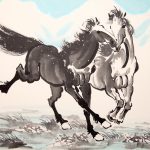Defining Happiness And Depression

Depression is a word that is often used to describe a mood or feeling; it is also a term describing a mental disorder. Happiness on the other hand can be viewed as a mood, but is more commonly considered a state of mind. Defining happiness usually includes an extreme emotional state that simply cannot, and should not last.
These four words may better describe the kind of “default” emotional temperament we would all do well to cultivate:
- Content: Being at peace and feeling good about who you are and what you have without regard to satisfying desires and needs. It is enduring. You carry it with you. Lao Tzu (as usual) got it right in few words: “One who contains content, remains content.” A striking aspect of this state of mind is that it does not foster passivity (which Western critics often attribute to the influence of Eastern philosophies).
- Comfortable: The word comes from a Latin root meaning “strength” and denotes a state of ease and freedom from pain and anxiety. To be comfortable is to enjoy contentment and security and presumably be stronger as a result. Like contentment, comfort is something you can carry with you, a feeling you should be able to access in a great variety of circumstances.
- Serene: Picture the peaceful calm of still air and an unclouded sky or a placid body of water. The word also refers to the absence of mental stress and anxiety. Again, this is an emotional state that can be cultivated, and maintained, even in the midst of external agitation. A Sufi fable tells of a ship of pilgrims engulfed by a great storm at sea. The passengers are gripped by fear. They wail and moan, sure that death is imminent. Only when the storm subsides do they notice that one of their number, a dervish, has sat through all the tumult in calm meditation. They crowd around him in wonder, and several ask him, “Don’t you know that at any moment we could have perished?” He replies, “I know that I might perish at any moment always and have learned to be at peace with that knowledge.”
- Resilient: The ability to bounce back from losses and reversals and not get stuck in painful or unproductive moods. Think of an elastic band that can be twisted and stretched but always tends to come back to its original shape. If you cultivate emotional resilience, you don’t have to resist feeling appropriate sadness; you learn that your moods are dynamic and flexible and soon return to the neutral balance point.
The term “depressed” on the other hand, means being consistently below these desirable states. It is distinct from sadness in that it is enduring and situation independent – changes in your circumstances, or simply the passage of time, have little to no effect on it.
In defining happiness and depression as terms, it is important to understand happiness and depression, and to make sense of your emotional life. With this vocabulary, you can take stock of where you are and where you want to go, and begin the process of getting there.











